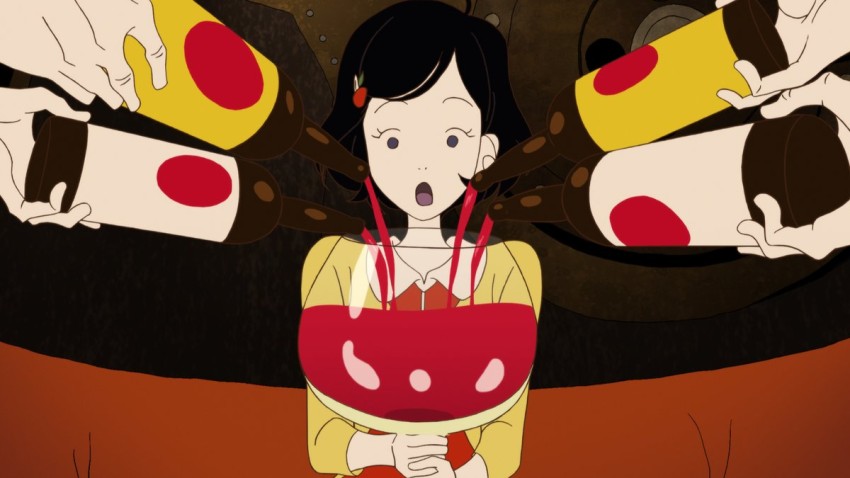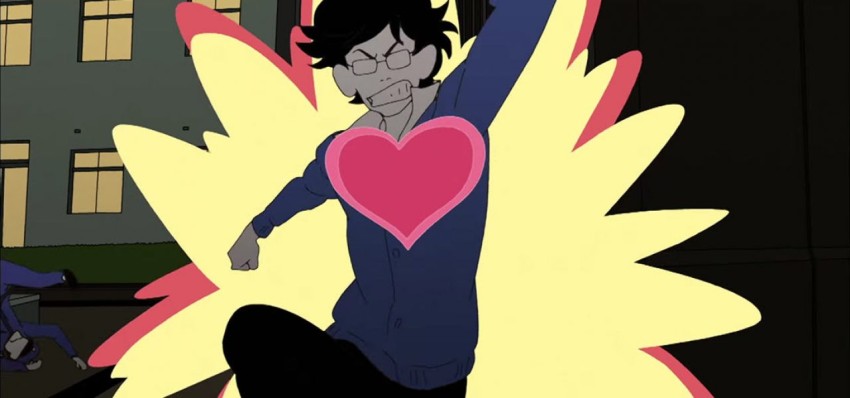The Night is Short, Walk On Girl
July 28, 2023 · 0 comments
By Andrew Osmond.
 Here’s a funny thing; there aren’t many out-and-out anime comedy films. Of course, there are plenty that have comedy – some of anime’s best comic characters are from films, like the indomitable trans heroine Hana in Tokyo Godfathers and the clingy BFF Tomohiro in A Silent Voice. But these films aren’t comedies; at most they’re comedy-dramas. For that matter, try to think of quality Western cartoon films that are primarily comedies. There are some, like Minions and Shrek, but not as many as you’d think.
Here’s a funny thing; there aren’t many out-and-out anime comedy films. Of course, there are plenty that have comedy – some of anime’s best comic characters are from films, like the indomitable trans heroine Hana in Tokyo Godfathers and the clingy BFF Tomohiro in A Silent Voice. But these films aren’t comedies; at most they’re comedy-dramas. For that matter, try to think of quality Western cartoon films that are primarily comedies. There are some, like Minions and Shrek, but not as many as you’d think.
Of course, spinoffs from comedy TV anime are often comedies too, but even they can be more serious on the big screen. Night is Short, Walk on Girl, however, is a comedy through and through – maybe too sophisticated to be called wacky, but certainly madcap, screwball and frequently insane. It’s also a TV spinoff of sorts. The film is a companion piece, though not sequel, to the series The Tatami Galaxy, and both were directed by the inimitable Masaaki Yuasa, who also brought us Mind Game and Ping Pong.
You don’t have to have seen Tatami Galaxy first (though there are Easter Eggs in the film if you have). You can think of Night is Short as a kind of modern Midsummer Night’s Dream, only set in Kyoto with fewer donkeys and more booze. Some of the story smacks of bug-eyed Shakespeare; there’s a runaway theatre troupe that dashes around the city, putting up guerrilla performances and blowing raspberries at authority.
But that’s only one segment of the film. The lead characters are a college-age girl and boy and their adventures on a night that seems to go on forever. The girl – referred to as “Girl With Black Hair” in the credits – is Miyazaki-grade capable in all that she does, performing legendary feats like drinking a demi-god under the table.
 The boy – referred to as “Sempai,” the Japanese honorific for “senior” – is effectively Wile E. Coyote to her Road Runner. He desperately chases after her, for pretty obvious reasons, but he hardly ever catches up. Instead he’s shoved into parallel adventures that sometimes recall American Pie: embarrassing accidents with ice-cream cones, meetings with perverted shunga addicts, and getting stripped of his trousers (and undies) in the opening minutes.
The boy – referred to as “Sempai,” the Japanese honorific for “senior” – is effectively Wile E. Coyote to her Road Runner. He desperately chases after her, for pretty obvious reasons, but he hardly ever catches up. Instead he’s shoved into parallel adventures that sometimes recall American Pie: embarrassing accidents with ice-cream cones, meetings with perverted shunga addicts, and getting stripped of his trousers (and undies) in the opening minutes.
The film’s like a cheerier take on After Hours, Martin Scorsese’s black comedy about Griffin Dunne lost at night in an unhinged New York. However, several of Night is Short’s sequences – especially the epic contests in which mortals take on gods at eating and drinking – could hail from a dozen countries’ legends and fairy stories. There’s also a musical sequence where characters sing at each for several minutes – common in Western animation, but a novelty in anime like this and Anthem of the Heart. And the tunes they sing… Well, judge for yourself, but to my ears, it sounded like a certain rhapsodic anthem from 1975.
The in-film music is by prolific musician Michiru Oshima, who was carried over from Tatami Galaxy and composes in a similar vein. But don’t pigeonhole her – she’s written for loads of other titles, including Fullmetal Alchemist, HAL, Fuse, Patema Inverted and parts of Beck. Another carry-over from Galaxy is the alt-rock band Asian Kung-Fu Generation, who provide the film’s closing song, “Walk the Wasteland”, heard midway through the trailer.
The character designer is Yusuke Nakamura, who created the cover art for the original Tatami Galaxy novel by Tomihiko Morimi. Morimi also wrote the source book for The Night is Short, as well as creating the loveable tanuki of The Eccentric Family, another fantasy set in Kyoto. This kind of literary connection is referenced in Night is Short, in a wonderful speech which connects Arthur Conan Doyle, Yukio Mishima and a dozen others.
The connections between Tatami Galaxy and Night is Short are obvious yet ambiguous. The anime seem to be set in worlds parallel to each other, which makes a lot of sense if you’ve seen Tatami Galaxy. The “Sempai” boy character in the film looks like Galaxy’s nameless hero, though his voice is different; the film actor is played by Gen Hoshino, best known as a singer and musician. Perhaps to balance him, the girl is voiced by one of the most ubiquitous actors in anime, Kana Hanazawa, who turns up in basically everything.
The supporting cast include drop-ins from Tatami Galaxy, such as the languid, big-chinned, probable-god guru Higuchi… though he’s voiced by a different actor, too, with Kazuya Nakai (Zoro in One Piece) taking over from Galaxy’s Keiji Fujiwara. Meanwhile, if you’re wondering about Ozu, the Gollum character in Galaxy who was the show’s real star, then rest assured he’s back in an amusingly different guise – and he’s still voiced by Hiroyuki Yoshino, Space Dandy’s Meow.
There are smaller look-ins as well. If you’ve seen Galaxy, then look out for a certain character with an embarrassing thing for life-sized mannequins, and a barnstorming role for everyone’s favourite metaphorical todger-cowboy (though the Woody-with-wood should really team up with Tatsuya Nakadai’s penis-demon from Belladonna). For Yuasa fans, these characters are old friends. For Yuasa newbies, they’ll be visitors from a freaky new world where the moon never sets. The night is short, you say? Siddown at that bar, kid, and open up the bottle. I’m going to tell you a long story…
Andrew Osmond is the author of 100 Animated Feature Films. Night is Short, Walk on Girl is released in the UK by Anime Limited.
Andrew Osmond, anime, cinema, Japan, Masaaki Yuasa, Michiru Oshima, Night is Short, Tatami Galaxy, Walk on Girl, Yusuke Nakamura
Leave a Reply